
Areas of nursing skills that are emphasised for first-year students
Here, we will give you insight into the different areas of skills. These can provide support and show you the way forward in supervision and assessment of the students’ learning and development process.
Ethical skills
In relation to ethical skills, emphasis is placed on students being aware of their own attitudes and values in their encounters with various patients and relatives. Students are encouraged to identify and reflect on how care, compassion, respect, dignity, and occupation-related ethical guidelines are expressed in their encounters with various patients. In addition, it is important to encourage reflection on ethical dilemmas the students experience.
Here, you can listen to a podcast about dignity. The podcast has been used in the students’ teaching and may be of help and support in supervision:
Mentorship practices that help students to develop their ethical skills in specific learning situations:
- Ask the students what they know about ethics, basic ethical principles, and occupational ethics.
- Observe and give students guidance and feedback related to identification of and reflection on various ethical challenges or dilemmas they experience. Ask the students how they feel when encountering such ethical dilemmas or challenges. For example, when using coercion, patients who do not want to eat, get up, cooperate, or shower – where dilemmas related to safeguarding patients’ autonomy are central.
- Encourage and guide students to apply and reflect on their knowledge and skills related to ethical skills; the ability to show care, compassion, respect, and dignity in various situations and encounters with patients and relatives.
Legal skills
In relation to legal skills, emphasis is placed on students having knowledge of and practising nursing in accordance with the Health Personnel Act and the Patient and User Rights Act, with particular emphasis on legislation relating to confidentiality, documentation, the use of coercion, as well as the right to self-determination and information.
Mentorship practices that help students to develop their legal skills in specific learning situations:
- Ask what students know about legislation that deals with things such as confidentiality, patients’ right to self-determination and information, use of coercion and documentation requirements.
- Observe and provide students with guidance on legal reflections and the application of legislation in different situations.
- Encourage students to apply knowledge about legislation and reflect on the relationship between ethics and legislation.
- Observer og gi studentene veiledning og tilbakemeldinger knyttet til deres relasjons- og kommunikasjonsferdigheter, både verbalt og non-verbalt i samhandling med pasienter og pårørende.
Interactive skills
In relation to interactive skills, emphasis is placed on student nurses developing and reflecting on their relational skills in their encounters with various patients, relatives and collaborating healthcare personnel. Emphasis is placed on interaction and communication with regard to the special needs of the elderly and patients with dementia.
Mentorship practices that help students to develop their interactive skills in specific learning situations:
- Ask students what they know about communication and communication techniques when encountering various patients – such as patients with dementia, aphasia, cultural and linguistic considerations, reduced hearing, and vision.
- Observe and provide students with guidance and feedback related to their relationship and communication skills, both verbal and non-verbal, when interacting with patients and relatives.
- Encourage and guide students to reflect on the importance of good relational skills, attitudes, and a caring manner in their nursing practice.
- Ask what the students find difficult regarding communication and interaction with patients, and provide guidance, support, and good advice.
Patient-oriented nursing skills
In relation to patient-oriented nursing skills, emphasis is placed on the practice of nursing care based on the individual patient’s experiences and resources, as well as safeguarding basic needs. Here, the Data Collection Guide can be used to support your supervision. This involves the students applying the nursing process to collect data and assess patients’ need for nursing care. In addition, emphasis is placed on students performing basic nursing skills in a caring and responsible manner, both independently and under supervision.
Here you will find online lectures and PowerPoint presentations about the nursing process from the student syllabus that can support your mentorship practices. In addition, a form has been prepared that can be used to assess the quality of the nursing plan drawn up by the student.
Mentorship practices that help develop patient-oriented nursing skills in specific learning situations:
- Ask the students what they know about the nursing process, with emphasis on data collection related to basic needs and patients’ experiences and reactions to illness, functional impairment, and life situation.
- Encourage students to use their senses (sight, hearing, smell, and touch) to collect data in encounters with patients to map and assess the need for nursing care so that they develop their observational and assessment skills.
- Observe and give students guidance and feedback related to their observational skills in encounters with different patients.
- Provide students with electronic documentation system training, and ask them about, observe them and guide them in good nursing documentation.
- Demonstrate and provide guidance in the performance of practical skills so that these are carried out in a caring and professionally sound manner.
Pedagogical skills
In relation to pedagogical skills, emphasis is placed on patient involvement, information, and guidance. This involves making students aware of the importance of, as well as using and promoting the patients’ own resources, encouraging involvement and participation by providing relevant information and guidance.
Mentorship practices that help students to develop their pedagogical skills in specific learning situations:
- Ask what the students know about the importance of patient involvement adapted to the patients’ age, life situation, cognitive functional level, experience, culture, and language background.
- Observe and provide the students with guidance and feedback related to how they facilitate patient participation and involvement.
- Encourage and guide students in patient involvement and participation based on the patients’ needs and prerequisites for receiving information and guidance.
Management skills
In relation to management skills, emphasis is placed on the management of one’s own work. This involves students managing their own work in an appropriate manner by planning, prioritising, and understanding their own responsibilities when collaborating with others.
Mentorship practices that help students to develop their management skills in specific learning situations:
- Ask how the students will plan their work. For example, this might include what type of equipment they need in a given situation, and how and why they want to prioritise their work tasks the way they do.
- Observe and provide students with guidance and feedback on how they manage their own work in relation to planning, prioritisation, flow, as well as working in an appropriate manner.
- Encourage and guide students so that they gradually develop the ability to take more independent responsibility in their nursing practice. For example, from simply observing to taking co-responsibility for one or more patients.
Skills related to patient safety
In relation to skills associated with patient safety, emphasis is placed on basic infection control, observance of hygienic principles, as well as identification of risk factors in patients. Risk factors may include swallowing difficulties, risk of falling, risk of pressure ulcers, complications associated with bed rest, language difficulties, and nutritional risks. In addition, emphasis is placed on training and use of the electronic patient record system at the department/ward. In the first year, medication management is not a defined learning outcome.
Mentorship practices that help students develop skills related to patient safety in specific learning situations:
- Ask students what they know about hygienic principles, basic infection control and risk factors at the individual level.
- Observe and provide the students with guidance and feedback on how they safeguard patient safety and are able to identify risk factors in different situations.
- Encourage and guide students to identify and reflect on possible risk factors in patients they provide nursing care to.
Learning skills
In relation to learning skills, emphasis is placed on the use of theoretical knowledge, reasoning, and reflection on one’s own actions. Students must show responsibility and independence, as well as document their own learning and development process. This involves students actively seeking out learning situations, making their knowledge visible, explaining their assessments and actions, showing interest, asking questions, and initiating and receiving guidance.
Mentorship practices that help students to develop their learning skills in specific learning situations:
- Clarify the expectations you have of the students and guide them in their learning and development process so that they are aware of their own areas of mastery and growth.
- Observe and provide students with guidance and feedback according to specific learning situations so that they become aware of their professional knowledge, practical skills, and attitudes in the practice of nursing.
- Encourage and guide students to reflect on their actions and their nursing identity, either on their own, with you as their professional training supervisor, or with other fellow students and colleagues.
A resource that can be used in supervision and assessment of areas of nursing competencies and skills
The students require support and guidance to understand how the different areas of skills in a given learning situation are connected and constitute a whole in the practice of nursing. We have prepared a form that you can use in the supervision and assessment of students’ nursing competencies and skills in various learning situations. This resource can be used actively together with the students throughout the student’s placement period, as well as in preparation for the mid-term and final assessment.
The resource can also be used as preparation before a learning situation, as well as during learning situations in which you can guide and observe the students. After a learning situation, you can use the resource to raise awareness and encourage students to reflect on their own actions and experiences based on different areas of skills. You can ask for academic explanations and give feedback on what you feel are the student’s areas of mastery and growth.




